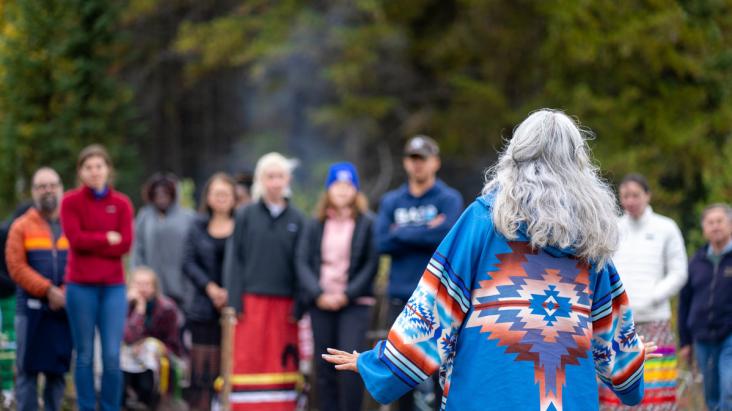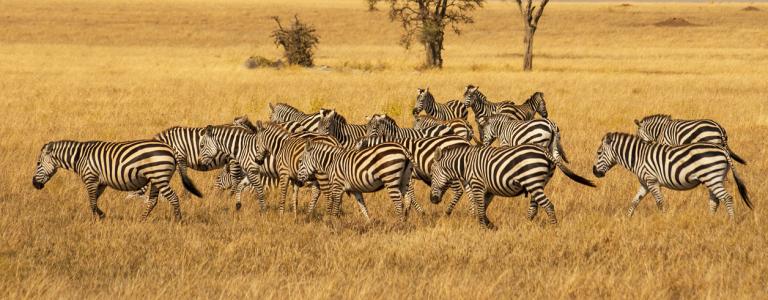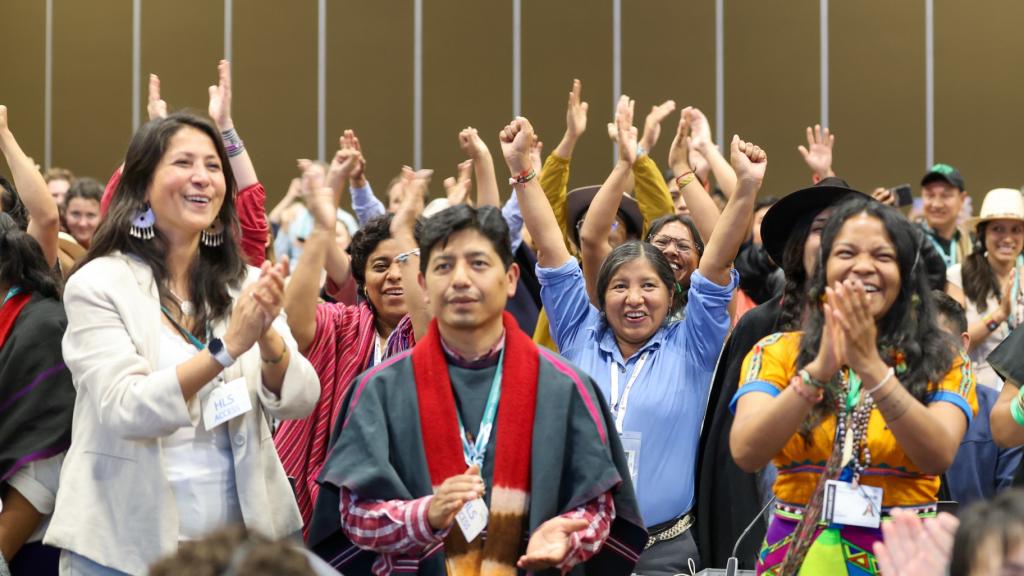Inside the UN Biodiversity Conference (CBD COP 16)
As the planet approaches a critical threshold of irreversible biodiversity loss, world leaders convened in Cali, Colombia, to advance the implementation of the Kunming-Montreal Global Biodiversity Framework (GBF).
November 2, Cali - Delegates departed from the United Nations Biodiversity Conference (CBD COP 16) after two weeks of negotiations in Cali, Colombia. The talks, which comprised the biggest biodiversity COP to date, focused in large part on how to implement and finance the Global Biodiversity Framework (GBF), adopted two years ago, as well as how to measure progress.
"COP 16 was an opportunity to double down on our commitment to halt and reverse biodiversity loss and ecosystem degradation," says Alec Crawford, Director of Nature for Resilience at IISD. "There were some very real wins, and the Colombian government should be applauded for the energy, coordination, and strong sense of community that they brought to the conference as well as to the profile of biodiversity. But the lack of progress on some key negotiation items is concerning."
First, the positive. The critical role of Indigenous Peoples and local communities in biodiversity protection was elevated through the adoption of a new work programme and creation of a permanent body of the CBD to represent their interests. A series of modalities for placing into effect the multilateral benefit-sharing mechanism from the use of digital sequence information on genetic resources were adopted, and the Cali Fund was established. Further pledges were made to support and expand the GBF Fund, to the tune of USD 163 million. And modalities for ecologically or biologically significant marine areas were agreed.
Also encouraging was the decision on climate change and biodiversity loss, as well as the attention—both in the negotiations and across side events—to the need to align related international efforts. "These crises are inextricably linked, we can’t tackle one without the other," says Crawford. "Thankfully, negotiators continued to explore how to more effectively bring these two agendas together."
Without new biodiversity plans in place, governments will be hard pressed to protect and restore nature in a way that reverses the catastrophic losses we’re witnessing across many ecosystems.
With the 16th meeting of the Conference of the Parties (COP 16) to the Convention on Biological Diversity (CBD) scheduled to end on Día de los Muertos, Day of the Dead, delegates were poignantly reminded of the symbol of the meeting, the Inírida flower, a symbol of resilience and immortality. For many, this was a signal of the resilience and ambitions needed for COP 16 to sustain and maintain life on the planet to 2030 and beyond. Biodiversity loss is a cross-cutting issue, with interlinkages to climate change, pollution, and land degradation. And biodiversity has a foundational role for many sectors of society, from food to biotechnology and timber to pharmaceuticals.
As the first COP since the landmark adoption of the Kunming-Montreal Global Biodiversity Framework (GBF) in December 2022, COP 16 was dubbed by some as the “implementation COP.” With calls made, and possibly heeded, to bring all of society on board in achieving the objectives of the CBD, COP 16 was also labeled as the “People’s COP.” Beyond mere inclusivity, the Convention calls for fairness, equity, and champions the full and meaningful participation of all relevant actors, including, importantly, the voices of biodiversity stewards, Indigenous Peoples and local communities (IPLCs).
While deliberations on various aspects of implementation, equity, and justice filling every moment of the conference, in the end COP 16 was unable to agree and adopt everything on its full agenda. Following nearly 24 hours of deliberations on the last day, in the early hours of Saturday, 2 November 2024, COP President Susana Muhamad (Colombia) introduced a draft decision on resource mobilization, including a provision establishing a dedicated global financing instrument for biodiversity under the COP’s authority. A debate ensued, with developing countries welcoming this decision implementing CBD Article 21 (Financial Mechanism), but developed countries opposed it, citing fragmentation of the global financial landscape. At 8:15 am, as delegates were leaving to catch their flights back home, Panama requested a quorum check. There, indeed was no quorum and the meeting suspended at 8:27 am.
Read a full summary and analysis from the IISD Earth Negotiations Bulletin team
Need to Know: Key Things We Want to See at COP 16
IISD's Earth Negotiations Bulletin Reporting On-Site
For over 30 years, Earth Negotiations Bulletin has provided authoritative, in-depth reporting on United Nations negotiations involving the environment and development. Our reporters will be covering each day of the talks in Cali, explaining what's happening and what it means for climate action.
Read MoreOur Insights

COP 16 in Cali Delivers Key Outcomes for Nature but Questions Remain on Funding
There were some very real wins, and the Colombian government should be applauded for the energy, coordination, and strong sense of community that they brought to the conference as well as to the profile of biodiversity. But the lack of progress on some key negotiation items is concerning.

The Triple-COP Year: What it means for nature
In 2024, the Rio Conventions on biodiversity, climate change, and desertification will have their negotiations in the same year. We take a look at the implications for nature.

How to Make Nature-Based Solutions for Adaptation Work for Everyone
Effective nature-based solutions (NbS) for adaptation start with integrated climate risk assessments. These take-aways will help practitioners plan for inclusive and sustainable NbS.

COP 16 Will Hinge on Who Benefits from Nature’s DNA
What to expect in Cali as the UN Biodiversity Conference gets underway, explained by the team leader of the global neutral reporting service Earth Negotiations Bulletin.

For Nature-Based Solutions to Be Effective, We Need to Work with Indigenous Peoples and Local Communities
Nature-based solutions have been praised as a promising approach to tackling the twin crises of climate change and biodiversity loss. But some Indigenous Peoples and local communities are questioning the legitimacy of the concept and what it symbolizes. It is time to listen to what they have to say.

Biodiversity Is in Crisis—Here's one way to fix it
A growing movement of projects and partnerships is using locally driven and gender-responsive nature-based solutions to address the twin crises of climate change and biodiversity loss. Scaling up this work to match the urgency and reach of the crises will be a challenge—but it’s one we must embrace.
Our COP 16 Experts

Anne Hammill
Associate Vice-President, Resilience

Lynn Wagner
Senior Director, Tracking Progress

Alec Crawford
Director, Nature for Resilience

Benjamin Simmons
Director, Sustainable Infrastructure

Aia Brnic
Communications Manager

Hans Baumgarten
Strategic Advisor

Liesbeth Casier
Lead, Public Procurement and Sustainable Infrastructure and Coordinator of the NBI Global Resource Centre

Calais Caswell
Policy Advisor II, Gender Equality and Social Inclusion

Becca Challis
Communications Officer

Veronica Lo
Senior Policy Advisor

Juliet Perry
Communications Manager

Paulina Resich
Senior Communications Manager

Valentina Romoli
Policy Advisor and Coordinator

Anika Terton
Senior Policy Advisor and Lead

Elsa Tsioumani (PhD)
Writer/Editor Earth Negotiations Bulletin

Farooq Ullah
Senior Policy Advisor and Lead, Energy and Climate Governance

